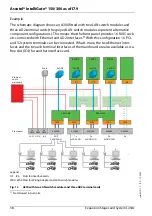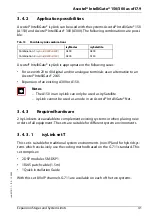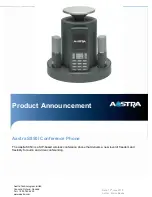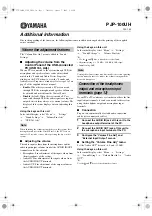
Ascotel® IntelliGate® 150/300 as of I7.9
Expansion Stages and System Limits
27
sy
d-
021
0/1.
7
– I7.
9 – 1
2.
2009
3. 2. 2
Basic functions
The basic functions of the systems depend first and foremost on the available DSP
resources (DSP = Digital Signal Processor). The DSP chip on the mainboard pro-
vides signal processing functions for conference circuits, DTMF sender and receiver,
compression of voice data, etc.
Part of these DSP resources is allocated to fixed functions and can be used without
licences (see
).
Another part is allocated to selectable functions, according to requirements. These
functions are partly subject to licence (see
The basic functions of the basic systems can be expanded by fitting DSP modules.
The functions of the DSP chips on the modules can also be configured (see
).
Fixed basic functions of the basic systems
The table below provides an overview of the fixed basic functions of the basic sys-
tems. No licences or additional hardware is required to use the functions.
Tab. 4
Fixed basic functions of the basic systems
Max. number of simultaneous ...
A150
A300
connections (without DECT)
10
30
Circuits for the functions "Three-party conference", "Six-party conference",
"Intrusion" and "Silent intrusion"
1)
1)
The circuits can be used for an individual function or mixed.
4
4
Usable DTMF sender
2
2
Usable DTMF receiver
4
4
Usable dial tone receiver
2
4
Circuits for the Call Waiting function
2
2
Channels for playing Courtesy Announcements
3
3
Channels for playing Music on Hold
1
1
Basic Voice Mail channels (G.711)
2)
2)
for use without licence. Voice memory capacity of approx. 20 minutes. No Audio Guide. A licence is required
to use the "Auto Attendant" function.
2
2
FSK receiver for CLIP detection on analogue network interfaces
2
2
FSK transmitter for CLIP display on analogue terminals
2
2
















































